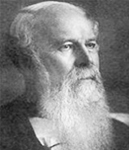
The Word Made Flesh II
J.C. Ryle
The cautions just given may seem at first sight needless, wearisome, and hair-splitting. It is precisely the neglect of such cautions that ruins many souls. This constant, undivided union of two perfect natures in Christ’s person is exactly that which gives infinite value to His mediation6 and qualifies Him to be the very Mediator7 that sinners need. Our Mediator can sympathize with us because He is very man. And yet, at the same time, He can deal with the Father for us on equal terms because He is very God. The same union gives infinite value to His righteousness when imputed8 to believers—the righteousness of one Who was [and is] God as well as man. The same union gives infinite value to the atoning9 blood that He shed for sinners on the cross—the blood of one Who was [and is] God as well as man. The same union gives infinite value to His resurrection: when He rose again as the Head of the body of believers, He rose not as a mere man, but as God. Let these things sink deeply into our hearts. The second Adam is far greater than the first Adam was. The first Adam was only man, and so he fell. The second Adam was God as well as man, and so He completely conquered.
Let us leave the subject with feelings of deep gratitude and thankfulness. It is full of abounding consolation for all who know Christ by faith and believe on Him.
Did the Word become flesh? Then He can be touched with the feeling of His people’s infirmities because He has suffered Himself, being tempted. He is almighty because He is God, and yet He can feel with us because He is man.
Did the Word become flesh? Then He can supply us with a perfect pattern and example for our daily life. Had He walked among us as an angel or a spirit, we could never have copied Him. But having dwelt among us as a man, we know that the true standard of holiness is to “walk even as He walked” (1Jo 2:6). He is a perfect pattern because He is God. But He is also a pattern exactly suited to our [needs] because He is man.
Finally, did the Word become flesh? Then let us see in our mortal bodies a real, true dignity, and not defile them by sin. Vile and weak as our body may seem, it is a body that the eternal Son of God was not ashamed to take upon Himself and to take up to heaven. That simple fact is a pledge that He will raise our bodies at the last day and glorify them together with His own.
—-
From Expository Thoughts on the Gospels: St. John, Vol. 1, in the public domain.
6. mediation – act of coming between two hostile parties to restore peace.
7. Mediator – a go-between; “It pleased God in His eternal purpose, to choose and ordain the Lord Jesus His only begotten Son, according to the covenant made between them both, to be the Mediator between God and man; the Prophet, Priest, and King; Head and Savior of His Church, the heir of all things, and judge of the world: unto Whom He did from all eternity give a people to be His seed, and to be by Him in time redeemed, called, justified, sanctified, and glorified. (Second London Baptist Confession, 8.1) See FGB 183, Christ the Mediator.
8. imputed – put to one’s account; See FGB 191, Imputed Righteousness.
9. atoning – covering the guilt of sin; See FGB 225, The Work of Christ, and 227, Atonement
All Rights Reserved. Used with permission. No part of this article may be used or reproduced in any manner whatsoever or translated without written permission.

